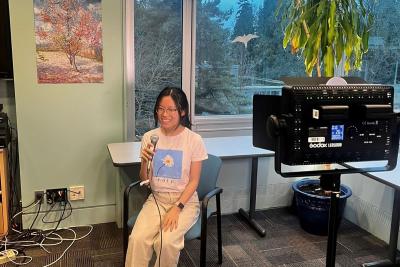Featured Student: Rachel Chiu
February 3, 2025

February 3, 2025

I’m studying Cognitive Systems (Computational Intelligence and Design), with an expected graduation date of May 2026.
I joined Co-op to gain practical experience and build a more competitive resumé for after I graduate. However, I quickly realized that Co-op offers much more — it’s an excellent opportunity to explore career paths, understand company culture and discover what I value most in a workplace.
I worked two consecutive terms (8 months) as an IT Support Technician with The College of Physicians and Surgeons of BC (CPSBC), where I provided mostly internal technical support which gave me the opportunity to interact with different departments and learn about different people’s careers and professional journeys.
I can’t really pinpoint a specific experience, everything felt very new and intriguing to me.
Although, one of my favourite experiences was when I began going to the gym with a co-worker once a week, as neither of us had been there before. We’d also tried to invite others from the IT department — with varying degrees of success.
My proudest achievement was leading the renovation of the company's primary meeting space: the boardroom.
This introduced me to project management, including: coordinating with vendors, presenting progress updates and gathering user feedback to ensure the final product met needs. When starting at CPSBC, because everything was so new to me, I wanted to learn as much as possible and tried to get involved early on by requesting to learn more about how projects were organized and gaining permission to sit in on scrum meetings.
The trust and support that I received allowed me to grow immensely.
The most challenging aspect was balancing the demands of project management, such as communicating effectively with diverse stakeholders and addressing conflicting requests. I overcame these challenges by seeking guidance from experienced colleagues, who generously shared their expertise.
Leading a major project taught me that hands-on experience is the best way to learn, even if you don’t feel entirely ready.
I also developed time management and prioritization skills, particularly when handling multiple technical support tickets. Additionally, setting personal goals throughout my Co-op term encouraged me to take initiative and make the most of my experience.
Co-op taught me the importance of company culture and how it can shape your work experience.
It also improved my communication and leadership skills, which have become invaluable in my roles managing school clubs. For example, I learned to establish expectations early, ask clarifying questions and ensure alignment to avoid misinterpretations — a habit that will benefit me in any career.
The workshops, particularly the sample resumés and cover letters, were valuable resources.
My Co-op coordinator, Mina, was supportive throughout, providing critical feedback on my resumé and helping me prepare for interviews. These supports improved my application materials and gave me more confidence to perform well in interviews.
Co-op is an experience where the effort you put in directly shapes what you get out of it.
Take initiative and put yourself out there. Start small by familiarizing yourself with your team members; for instance, during my first two months, I wrote down the names of everyone in my department and set a goal of greeting one person each week.
Additionally, don't be afraid to step out of your comfort zone. Mistakes are valuable learning opportunities and it’s better to gain those lessons during Co-op, than later on in your career.
I’m looking forward to embracing change and exploring diverse career paths.
Co-op taught me that linear career journeys are rare and that it’s okay to pivot if something isn’t the right fit. This perspective made me more confident about navigating post-graduation opportunities and pursuing roles aligned with my evolving interests.
We honour xwməθkwəy̓ əm (Musqueam) on whose ancestral, unceded territory UBC Vancouver is situated. UBC Science is committed to building meaningful relationships with Indigenous peoples so we can advance Reconciliation and ensure traditional ways of knowing enrich our teaching and research.
Learn more: Musqueam First Nation